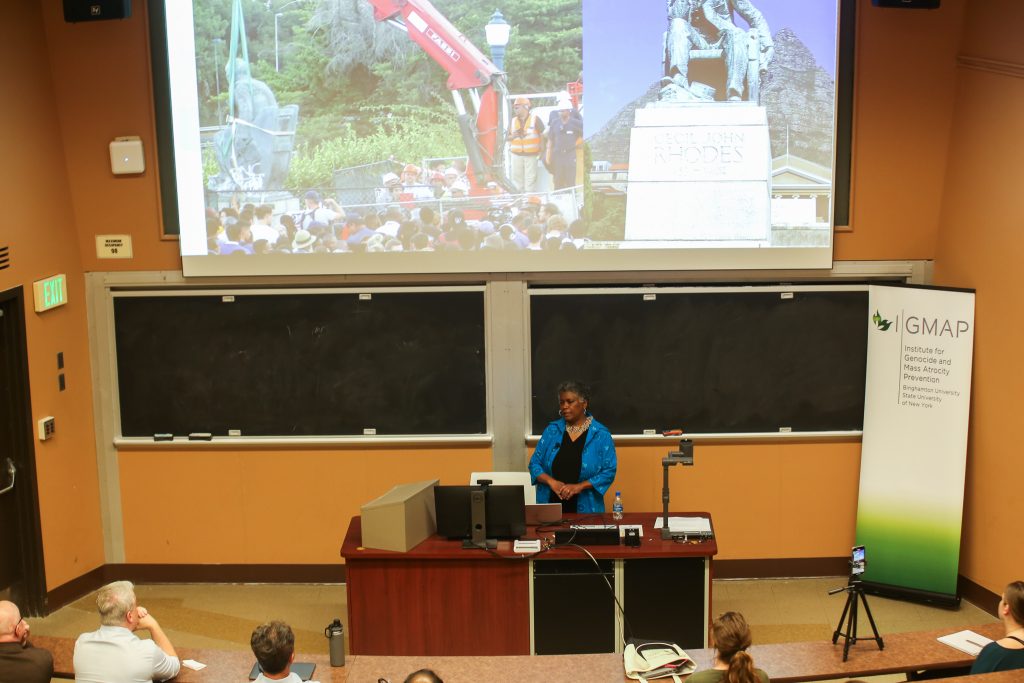Anti-apartheid activist Bonita Bennett held a talk called “Beyond Static Monuments: A Cape Town Story” with Binghamton University’s Institute for Genocide and Mass Atrocity Prevention this past Wednesday.
Bennett was the executive director at the District Six Museum in Cape Town, South Africa from 2008 to 2020, where she remains engaged as a research associate. After the apartheid government declared the district “whites only” and began evicting Black residents, community members organized the Hands Off District Six conference, where they discussed ways to cement District Six’s history in the collective memory. Many view this conference as the beginning of the District Six museum’s story, although it did not have a physical building until 1994.
“Black histories were not recorded or considered relevant in South Africa,” Bennett said. “There was almost no record that people had ever lived in District Six, and that’s why they came out to call for a place of memory.”
The museum’s goal is to build a space within the community where people can share their stories. It was not aimed at having curated exhibitions but at sharing the district and its residents’ living history.
Bennett said that the museum also “lays a great ground” for reducing xenophobia in South Africa, as many South Africans experiencing unemployment and struggling to find health care or housing tend to vilify refugees from other parts of Africa.
“Some of the things that we do address through the work of the museum is if a community understands that it’s got the cohesiveness to deal with different points of view and conflict,” Bennett said. “I think it lays a great ground for stopping things that have happened and continue to happen in our country, like xenophobia, for example, when people were South African, particularly Black, South Africans, who [are] battling for resources, unemployed, who [are] struggling for housing and healthcare, and they see refugees from other parts of Africa come into the country, and they vilify them and demonize them.”
Many of the museum’s exhibits are interactive artworks, including a district map people are encouraged to draw on. Many others are made up of community artifacts, like a pile of rubble from torn-down buildings in the area. All are established specifically to spark conversations and awaken memories.
“Monuments and statues are essentially closed stories,” Bennett said. “So that tells you the story of the four Nobel Prize rules. You can’t add to the story. You don’t feel part of the story. And there needs to be different ways of allowing people to be part of unfinished stories or unknown stories.”
Bennett also emphasized what she called “small stories,” saying movements start in church basements and around kitchen tables, and only after that slow, small start can they begin to grow. She said presenting only grand narratives makes it hard for people to feel motivated to make a difference.
Students across multiple academic years attended the talk and participated in a Q&A session after Bennett ended her lecture.
“I learned so much about District Six,” said Meeya Cummings, a freshman majoring in economics. “I was aware of apartheid and what had happened in South Africa and more specifically, Cape Town. But I was not entirely familiar with District Six. I also heard a lot about the District Six Museum and the work that they’re doing there for memorialization. [Bonita Bennett] had mentioned memorialization instead of monumentalism, so like using art to memorialize people, which I thought was really interesting.”
Bennett is one of the visiting practitioners the Institute for Genocide and Mass Atrocity Prevention invited to BU this year, along with speakers from Kosovo, Nicaragua and Iran. The institute is the first and only master’s program to focus solely on analyzing and preventing mass atrocities, aiming to educate not only master’s students but also hold campus-wide events to educate the Binghamton community.
“Our whole purpose for bringing people, visiting practitioners, to campus, is to make our students and our faculty and the whole campus community think beyond the boundaries of Binghamton,” said Kerry Whigham, an institute co-director. “To really bring the world to this campus, and to get our students to think about the very different ways that they can have an impact in shaping that world and changing that world in positive ways.”



